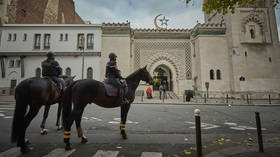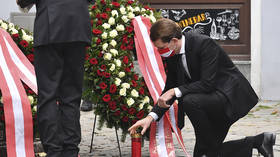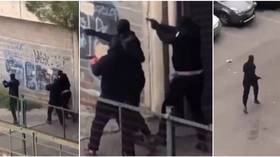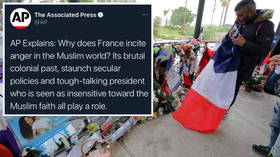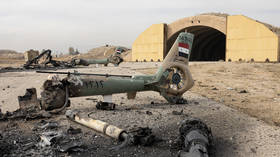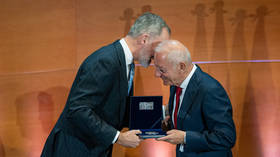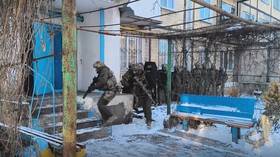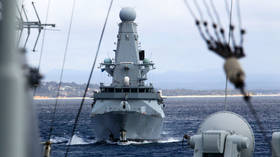As four are killed in Austrian attack, remember not all terrorism victims die. Some, like my friend, live with invisible scars
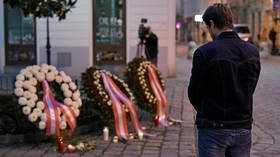
Four people were killed and many more injured after Islamist terrorist attacks in Vienna. But they won’t be the only victims – being caught up in horror like this causes psychological damage for life, as my friend knows very well.
Shortly before retiring to bed last night, Rob Burberry turned on the television news to catch up with the world outside. That was a big mistake.
For my 46-year-old friend and former work colleague was instantly struck by scenes of high drama taking place in the Austrian capital of Vienna, where six separate incidents of gunfire had been reported, four people were known to be dead and nearly 20 more had been injured, some now in hospital facing life-changing injuries following yet another Islamist attack on the continent.
The flashing lights of police cars, the heavily-armed security forces, the near-deserted streets and the news that gunmen were still on the loose brought his own very personal experience of terror on the streets of Europe flooding back just when he had been heading for bed.
Last night was a restless one for Rob.
He was caught up in the middle of a similar Islamist attack in Strasbourg in December 2018 and today, nearly two years later, he is still profoundly affected by the events of that night.
It’s left him struggling with post-traumatic stress disorder (PTSD) and taking prescribed antidepressants to help cope with continuing anxiety, fuelled by a nagging belief that he and his wife are no longer safe from harm.
Rob is proof that not all victims of murderous Islamists are those who are shot and stabbed in the street or decapitated in churches. Sometimes the victims survive, but bear hidden scars that live with them for a lifetime.
“Working at the European Parliament, I’d go to Strasbourg every month,” Rob recalls. “I’d stay in the same hotel, eat at the same restaurant and enjoy what I always thought was a really beautiful city.
“On the night of the terror attack there, I was dining alone at Aux Magots, a favourite neighbourhood restaurant, when a colleague texted me to say she’d heard there’d been a shooting and hoped I was safe. That was the first I knew of what was going on.”
What became clear as the evening drew on was that 29-year-old Chérif Chekatt, a so-called gangster-jihadist who had converted in prison to radical Islam, had launched a one-man wave of violence on locals and tourists visiting the popular Christmas markets in the centre of Strasbourg.
Also on rt.com WATCH Vienna orchestra playing to calm people who waited inside opera theater as terror unfolded on the streetsThe murderer shot and stabbed his way through the crowds, ultimately killing five people and leaving 11 seriously injured all in the space of just 10 minutes.
He then fled by taxi to his nearby apartment, boasting to the cab driver of what he had done and bragging he had a hand grenade at home. That home was located in the Neudorf neighbourhood, where Rob and his fellow diners found themselves penned in behind a police cordon, crouched behind the bar of Aux Magots and hoping death would pass them by this time.
Rob continues: “When a van pulled up outside and the police piled out with their military-style arms, I guessed their attention was now focused in the streets around us, and it was clear from Twitter that they hadn’t caught anyone at that point.
“Our waitress locked the door, turned off the lights and asked the dozen or so diners to shelter behind the bar, which we all duly obliged.
“The restaurant has floor to ceiling windows and it was a quiet night, so we had a good view of events unfolding directly outside and with 14 more vans chock full of police and two military SUVs arriving, it certainly felt we were closer to the action than we really would have wanted.
“Everyone stayed calm, the only light coming from the blue flashes of the police cars and the screens of our phones as we tried to work out from Twitter what was happening outside. One minute the police and security forces seemed calm, the next there would be loads of shouting and a flurry of action. People ran past at intervals as police evacuated nearby buildings, but we were just stuck there. Waiting.
“I knew that at least one crazy with a gun was on the loose out there. That meant if I left the restaurant at that point, I ran the risk of being shot dead in the street, alone and far from home with my wife, who by now had driven to be with family as she was worried for my safety. It was terrifying.”
Around midnight, after four hours crouched in the dark, a French policeman knocked at the restaurant door and told those inside they could return home and to their hotels, giving explicit directions on which way to leave.
Rob says, “I asked if they had caught anyone yet. The policeman replied, ‘Non’, so I told him I wasn’t going anywhere and everyone else agreed with me.
“That, for me, was the turning point. Despite all the high-spec tactical weaponry, military personnel, elite security forces and dozens of policemen, they could not keep me safe and were prepared to send me out into the night, knowing a gunman was on the loose and if I happened to come by him, I would be shot dead.
Also on rt.com ‘Islamist terrorism is our common enemy’: Germany’s Merkel expresses support to Austrians after Vienna attack“That wasn’t a risk I was prepared to take. What really began to bug me at that point was that if they couldn’t keep me safe, could anyone?”
The customers and staff from Aux Magots were finally given the all-clear two hours later, but still the attacker had not been found.
Rob made his way back to his hotel and along the way saw armed police holding a man at bay with outstretched automatic weapons pointed at him as they shouted instructions. He was simply an innocent passer-by, but the tension was palpable.
“At the hotel, the doors were locked but I was recognised by the staff who let me in,” Rob remembers.
“The lobby was far busier than you would ever expect at 2am and everyone was clearly concerned. I was running high on adrenaline but felt a strange feeling of living in a dream. There was a disconnect and I wasn’t sure whether it was simply exhaustion or maybe something else.
“I crashed on my bed for a few hours and woke around seven. The first thought in my head was ‘Have they caught him yet?’”
Despite the testimony of the taxi driver who drove Chekatt away from the carnage he had caused, it took police two days to finally catch the terrorist, shooting him dead after a chance encounter in the same Neudorf neighbourhood he had lived.
By that time, Rob was back in the UK, home with his wife behind the locked front door of their high-rise flat.
But a switch had been flipped. And while he should have felt safe at home, he started to ask questions after a completely unrelated disaster. A high-rise apartment block, Grenfell Tower, had caught fire in West London in June 2017 and the ongoing inquiry into the disaster which left 72 residents dead had found that combustible cladding on the building’s exterior had fuelled the flames as firefighters fought to control the blaze.
Outside his bedroom window, Rob could see his own apartment block and others around the Surrey development where he lived panelled in similar cladding, although the danger wasn’t brought home until a small fire in a flat below led to evacuation of the entire block one night in April 2019.
He recalls: “We were evacuating the block using the stairs with a father carrying his young infant in front of me. The acrid smell of smoke had reached three floors higher than its source and panic set in... I was already thinking that this scene was played out in Grenfell which led to 72 people dying.
“Once we had evacuated, fire engines tore up the approach to the building, lights were flashing, people were shouting and I was suddenly back in Strasbourg on the night of December 11, 2018, reliving the terror attack.
“I never really understood what a flashback was until then. I had that feeling again of being disconnected from what was happening right in front of me.
Also on rt.com Macron says he can ‘understand’ Muslim shock at Prophet Mohammed cartoons, but insists violence is unjustified“Now I know that was PTSD and Strasbourg was the trigger. When the police told me that basically they couldn’t keep me safe or guarantee my security, I felt cut adrift. We expected them to maintain order and discipline, but they couldn’t. I expected my flat to be a safety zone, our sanctuary where I could feel secure and comfortable, as is anyone’s human right. I was wrong there, too.
“Look, I escaped alive from my flat, as the fire was controlled. And in Strasbourg I wasn’t stabbed, I wasn’t shot and I feel deeply for those who were and for the families left behind. But I was affected in an invisible way by the trauma of that night two years ago that has seen me seek professional help with dozens of therapy sessions and even medication.
“No doubt, the horrific attack in Vienna will claim its share of psychological victims as well, when some of those caught up in the events find themselves struggling with the emotions that engulfed them without warning, when they were simply out having a beer or eating at a restaurant.
“I have no physical scars to show anyone after my experience of terrorism, but I can tell you that my life hascertainly changed forever because of Chérif Chekatt.
“This morning when I turned on the television news to find out the latest from the Vienna attacks, a familiar feeling of anxiety arose in my chest and I had two thoughts, ‘Have they caught the terrorists yet?’ and then, ‘where are my antidepressants?’”
Think your friends would be interested? Share this story!
The statements, views and opinions expressed in this column are solely those of the author and do not necessarily represent those of RT.

